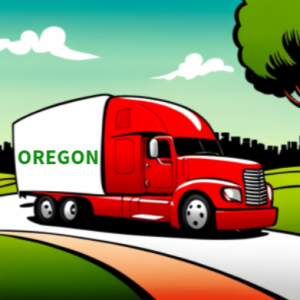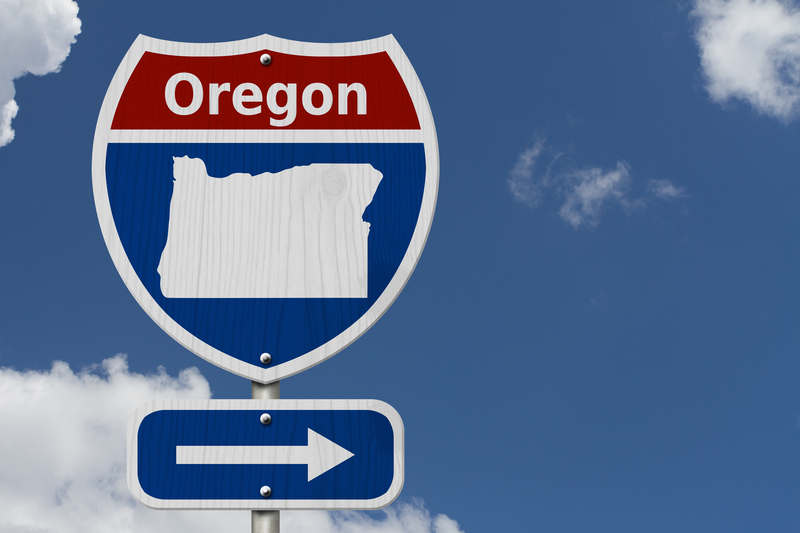Meeting Oregon’s Commercial Truck Insurance Minimums Just Got Easier with GEICO Now in the Game! Here’s how the process works:
ODOT requires Truckers hauling freight for hire across state lines to first get a USDOT number from FMCSA.
ODOT is the Oregon Department of Transportation.
FMCSA is the Federal Motor Carrier Safety Administration which oversees the Department of Transportation in the U.S.
Both ODOT & FMCSA then require Motor Carriers to provide proof of insurance.
How a New Trucker Gets Proof of Insurance in Oregon: Steps Explained
1. Apply to become a Motor Carrier and receive a new DOT number through the FMCSA Unified Registration System.
2. Your insurance company will send proof of your coverage to FMCSA by linking to your new DOT number.
3. This proof of insurance submission is called your BMC-91X Filing.
4. The MCS-90 is simply an endorsement to your policy ensuring FMCSA compliance…think of it as a Bond.
5. Your insurance provider also sends proof of your coverage to ODOT.
6. Oregon is unique in also requiring New Motor Carrier Training. The 8 hour class covers trucking basics to ensure compliance with registration, taxes, truck safety, size and weight regulations. The program is currently conducted by the Oregon Trucking Association.
There is a State Oregon Trucking Online Portal where you can register your truck, renew your plates, pay taxes etc and learn more.
But don’t rush into applying for your new DOT number just yet!
Becoming a new Motor Carrier in Oregon comes with its challenges 🙂
Before diving in, check if insurance fits your budget.
Working with a Transportation Insurance Specialist means getting guidance and free advice from the very beginning.
The best part? It doesn’t cost extra to have an advisor who’ll help you avoid costly mistakes.
Reach out to us first to estimate your upfront and overall trucking insurance costs.
It’s smart to understand potential expenses before starting a new trucking business.
Depending on your truck type or driving record, you might consider hauling for others until you’re fully prepared.
We’ll be honest and talk it through with you as your advocate.
It’s best to chat first, then if you ARE ready to get started, we can begin with these Simple Steps to Get Your DOT Motor Carrier Authority.
Why is Commercial Truck Insurance so Expensive in Oregon?
The number of companies underwriting trucking insurance is limited. This is because poor underwriting results and high litigation costs have discouraged new players from coming into the field of play. A company needs a lot of financial backing and accuarial underwriting success to enter the trucking insurance marketplace.
Is there a new Truck Insurance Option in Oregon?
Yes, Great news—GEICO is now available in the Beaver State!
They’re offering some awesome premiums for both new truckers and seasoned motor carriers, and we’re excited to team up with them to give you even more options.
Want to learn more? Check it out at Oregon GEICO Commercial Truck Insurance
What Insurance Limits does Oregon Require for Truckers?
FMCSA and ODOT require the same minimum insurance limits for vehicles hauling freight for hire across state lines:
Cargo Van and Sprinter Insurance
$300,000 CSL Commercial Auto Liability Coverage
Hot Shots and Larger Truck Insurance
$750,000 CSL Commercial Auto Liability Coverage
CSL = Combined Single Limit
It’s important to know that brokers and customers usually require $1,000,000 CSL Liability as an industry standard.
So while getting started with the minimum is fine, it makes sense to consider the cost of the eventual $1,000,000 in Liability.
What does Commercial Auto Liability Cover?
Commercial Auto Liability insurance has your back when you’re out driving your truck and accidentally hit someone or something.
Here’s how it works—it’s split into two parts:
- Bodily Injury Liability: If you cause an accident that leads to injuries, this covers things like medical bills, rehab, long-term care, funerals, lost income, and even pain and suffering.
- Property Damage Liability: If you damage something like another car, a building, or even a bike, this part’s got it covered.
So, if you’ve got $1 million in Commercial Auto Liability coverage, that total can go toward both bodily injury and property damage in a single accident.
Is General Liability the same as Commercial Auto Liability?
No, Commercial Auto Liability is the coverage you need to legally drive your truck, as required by ODOT and FMCSA.
General Liability is a different type of coverage that protects you for things you might do outside of driving.
Think loading and unloading accidents or delivery mishaps—it’s got you covered.
This is extra affordable coverage that you should consider, because your Brokers and Customers will!
Want to learn more? Check out Commercial Truck General Liability Explained.
What is the insurance that Covers your Truck?
Physical Damage Coverage protects the truck itself.
Here’s how it works:
Collision Coverage: If your truck gets into an accident—whether you hit another vehicle, an object, or it rolls over—collision coverage helps with repairs or even replacement.
Comprehensive Coverage: This takes care of non-collision damage. Things like theft, falling trees, wind, hail, or even hitting an animal. If it’s not a collision, this coverage usually steps in.
Your Physical Damage insurance is based on either the Actual Cash Value (ACV) of your truck or the Stated Amount.
Be sure to include any Permanently Attached Equipment in the value of your truck.
Examples of Permanently Attached Equipment:
- Custom paint, decals and signage
- Electronics that have been bolted or mounted to your truck
- Coupling devices like 5th wheel receivers
- Equipment and accessories for vacuuming
- Mounted tool boxes, shelving and ladder racking
- Tarps, chains and binders
What other insurance does a new Motor Carrier need?
Let’s talk about Motor Truck Cargo Insurance.
Even though FMCSA and ODOT don’t require it, your brokers and customers certainly will.
Basically, Motor Truck Cargo Insurance protects the freight you’re hauling, but there’s a little more to it.
You can learn the ins and outs at What Does Motor Truck Cargo Cover?
The most common coverage limit is $100,000—your Trucker Pro Agent will help you figure out exactly what you need and when to add it.
Extras to Consider for Your Oregon Trucking Coverage:
Uninsured or Underinsured (UM/UIM)
This coverage has your back if you’re hit by a driver with little or no insurance. It helps with things like medical bills, lost wages, and even pain and suffering if you or your passengers get hurt in an accident. Just remember, it only kicks in if the other driver is at fault and doesn’t have enough liability coverage to cover the damages.
Medical Payments (MedPay)
MedPay is there to help with medical bills or even funeral costs if you or your passengers are injured in a truck accident.
Both UM/UIM and Med Pay are affordable coverage options that should be included in your insurance package.
Thinking about becoming a Motor Carrier but need more info?
You’re in the right place!
Check out our CIS Trucking Insurance Blog—it’s full of answers to questions you didn’t even know you had:)
When you’re ready, give us a call at CIS (330) 864-1511.
We enjoy helping newbies get their ducks in a row so they can kick things off right!
We are CIS, and We Make Your Truck Insurance Easy!

Authors
Shelly Benisch, CIC, TRS started Commercial Insurance Solutions, Inc. (CIS) in 2002 and brings over 30 years of experience in Commercial Truck Insurance. As one of the top 25 Progressive Truck Insurance Agency Leaders in 2024, she helps small Motor Carriers and Owner Operators across the country find affordable trucking insurance quotes with GEICO, Progressive and more. Shelly also writes a free Trucking Blog packed with insurance tips for all kinds of Small Carriers. Her team of Truck Insurance Experts have earned CIS consistent 5-star Google reviews and Progressive's Top 25 Truck Elite Status. For expert Commercial Truck Insurance advice, give Shelly a call at (330) 864-1511 #CISDoesThat Commercial Truck Insurance for owner operators and small motor carriers.
CEOChristina Cummings, TRS certified, leads Commercial Insurance Solutions, Inc. (CIS) as Executive Director and true experienced advice on Commercial Truck Insurance. She secures the most affordable GEICO quotes and Progressive quotes...and more for small Motor Carriers and Owner Operators nationwide. She is your "go to" person at CIS for advice with underwriting questions, tips and networking opportunities for Small Truckers. Under her leadership CIS earned Progressive's Top 25 Truck Elite status in 2024 and consistent 5-Star Google reviews. She also co-authors the free CIS Commercial Truck Insurance Blog for small Motor Carriers and Owner Operators, sharing her bottom line tips on how to find more affordable Commercial Truck Insurance. Looking for expert trucking insurance advice–Christina is your go to leader at (330) 864-1511 #CISDoesThat

